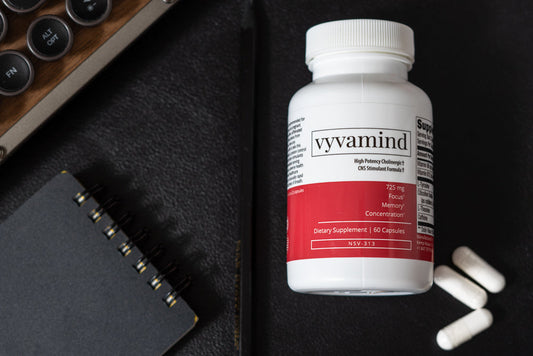Vegan Brain Fog: Causes, Supplements To Use & More

The relationship between diet and cognitive function is complex, especially when making a significant change like going plant-based. Some people report feeling mentally sharper after switching to a vegan diet, while others describe a temporary fog settling over their thoughts. Whether you're experiencing clarity or cloudiness, understanding the science behind how nutrition affects your brain can help you optimize your plant-based journey.
Your brain's relationship with food is more complex than a simple fuel equation. When you shift to a plant-based diet, you're not just changing what's on your plate – you're rewiring an intricate network of nutritional pathways that directly impact your cognitive function. This matters because your mental clarity isn't something you want to compromise, regardless of your dietary choices.
In the next few minutes, we'll cut through the noise about vegan brain fog and get straight to what you need to know. You'll learn which specific nutrients might be playing hide-and-seek in your plant-based diet, what that means for your brain function, and most importantly, how to fix it. We'll explore practical solutions, from strategic supplementation to smart food choices, that keep your mind sharp while staying true to your plant-based principles.
This isn't about challenging your dietary choices – it's about optimizing them. Whether you're three days or three years into your vegan journey, or just contemplating the switch, understanding these cognitive connections will help you make informed decisions about your brain health. Let's get your mental clarity back on track.
What Is Brain Fog?
Ever tried to grasp a thought that keeps slipping away, like trying to catch smoke with your hands? That's brain fog – a frustratingly real state of mental confusion that goes beyond just having an "off" day. It's not a medical diagnosis, but rather a constellation of symptoms that can make even simple tasks feel like solving a complex puzzle.
Think of brain fog as your brain's check engine light. While everyone experiences mental sluggishness occasionally, persistent cognitive cloudiness often signals that something in your system needs attention. The causes can range from lifestyle factors like insufficient sleep to dietary imbalances, and yes, sometimes it shows up during dietary transitions.
When brain fog settles in, you might notice:
- Your usual sharp memory playing hide and seek, with familiar names and facts stubbornly staying just out of reach
- New information bouncing off your brain instead of sticking like it usually does
- A persistent mental fatigue that coffee just can't seem to cut through
- Words playing hard to get during conversations, leaving you grasping for expressions that should come naturally
- Decision-making feeling like navigating through thick fog, even for simple choices
- That overwhelming sensation when faced with tasks you normally handle with ease
- Your usual spark of motivation flickering rather than burning bright
- A peculiar sense of disconnection, as if you're watching your day through a slightly foggy window
- Previously simple organizational tasks suddenly requiring extra mental effort
While a temporary mental haze is often just your brain's response to stress or a bad night's sleep, persistent fog needs attention. If your cognitive clarity has been MIA for more than a few weeks, it's worth checking in with a healthcare provider. They can help determine if there's an underlying cause – whether it's nutrient-related or something else entirely – and get you back to your usual sharp self.
Can A Vegan Diet Cause Poor Cognitive Function?
The surge in plant-based eating has brought with it some valid questions about brain health. While many thrive on a vegan diet, others report cognitive changes that deserve a closer look. The key lies in understanding not just what you're eliminating, but what your brain needs to function at its best.
Your brain operates like a finely tuned machine, requiring specific nutrients as its premium fuel. Some of these nutrients traditionally come from animal sources, which is where things get interesting for plant-based eaters. Take vitamin B12, for instance – it's crucial for keeping your neural pathways firing properly, but it's primarily found in animal products. Without it, your cognitive performance can take a hit.
The omega-3 situation adds another layer of complexity. While you can get these essential fatty acids from plant sources like flax and chia seeds, there's a catch: your body needs to convert them into the active form your brain prefers, and this conversion isn't always efficient. Fish and other animal sources provide these fats in a ready-to-use form that your brain readily absorbs.
B6 is another player in this nutritional chess game. This vitamin is vital for your nervous system's messaging service, and while it exists in plant foods, maintaining optimal levels can require more attention on a vegan diet. When these nutrients fall below optimal levels, you might notice effects on your mental clarity and cognitive performance.
Here's the good news: a vegan diet doesn't have to mean compromising your cognitive function. Think of it as a puzzle where you need to be strategic about putting the pieces together. Supplementing with B12, considering algae-based omega-3s, and carefully planning your nutrient intake can help maintain your brain's peak performance. The key isn't whether a vegan diet can work for your brain – it's about making sure you're giving your brain what it needs within your chosen dietary framework.
Success with a vegan diet comes down to informed planning rather than chance. With the right knowledge and approach, you can maintain sharp cognitive function while staying true to your plant-based choices. It's not about limiting your options – it's about optimizing them.

Other Deficiencies Which Can Cause Brain Fog
Brain fog isn't exclusively a vegan issue – your cognitive clarity can take a hit regardless of your dietary choices. Even those enjoying a steak dinner every week might find themselves in a mental haze if they're missing key nutrients. Let's look beyond the plant-based discussion to understand the broader nutritional picture of brain health.
Think of zinc as your brain's construction and maintenance crew. When zinc levels drop, your neural pathways don't communicate as efficiently as they should. The result? That frustrating feeling when your thoughts seem to move through molasses. Iodine plays an equally crucial role – it's like your brain's development supervisor, ensuring everything grows and functions according to plan. When iodine runs low, your mental processing power often follows suit.
Iron deficiency can leave you feeling like your brain is running on a dying battery. Without adequate iron, your blood can't deliver enough oxygen to your brain, leaving you mentally drained and foggy. Meanwhile, amino acids serve as the building blocks for your neurotransmitters – the messengers that keep your thoughts flowing smoothly. When these are in short supply, your cognitive function might start to sputter.
Here's the crucial point: simply including animal products in your diet doesn't automatically shield you from these deficiencies. Whether you're vegan, omnivore, or somewhere in between, the key lies in maintaining a thoughtfully planned diet that covers all your nutritional bases. It's about quality, variety, and consistency rather than just checking boxes for specific food groups.
The 5 Best Supplements For Vegan Brain Fog
Switching to a plant-based diet doesn't mean accepting mental fog as your new normal. While thoughtful meal planning forms the foundation of brain health, strategic supplementation can help fill any nutritional gaps. Here's your clear-headed guide to the most effective supplements for maintaining cognitive sharpness on a vegan diet.
Think of these supplements as your brain's backup system:
- B-Vitamins - particularly B12 - are non-negotiable for vegans. It's like having a cellular communication network; without enough B12, your brain's messages start getting scrambled. Even if you're only vegetarian, B12 supplementation often makes the difference between mental clarity and confusion.
- Omega-3 Supplements - specifically algae-based ones that provide EPA and DHA - directly support your brain's operating system. While flax and chia seeds are great, your brain needs these specific forms of omega-3s, and algae supplements deliver them in their most usable form.
- Caffeine deserves its spot on this list, but not just as your morning wake-up call. Beyond the initial alertness boost, it can enhance your mental processing speed and help maintain focus throughout the day. Whether through green tea or supplements, it's a reliable cognitive enhancer when used mindfully.
- Citicoline acts like your brain's maintenance crew, supporting blood flow and cellular health while boosting acetylcholine - a crucial neurotransmitter for learning and memory. It's particularly valuable when you're tackling mentally demanding tasks.
- N-Acetyl L-Tyrosine keeps your brain's reward and motivation systems running smoothly by supporting neurotransmitter production. Think of it as your mental clarity insurance, especially during stressful periods or when you need sustained focus.
The key is recognizing that these supplements work best as part of a well-planned vegan diet, not as a replacement for good nutrition. Start with one or two based on your specific symptoms and gradually adjust based on how your body responds.

Using Vyvamind For Vegan Brain Fog
Let's look critically at Vyvamind, one supplement combination that's gained attention in the vegan community for addressing cognitive concerns. What makes this particular formula interesting is its comprehensive approach to brain support, combining several of the key nutrients we've discussed.
The supplement brings together:
- Citicoline - Works to enhance blood flow to your brain and support cell health, while elevating acetylcholine levels that are crucial for learning and memory retention
- Caffeine - Provides a clean mental energy boost and enhanced focus, carefully balanced to avoid the jitters some people experience with coffee
- Theanine - Partners with caffeine to create sustained alertness without anxiety, helping maintain calm focus throughout the day
- Tyrosine - Supports your brain's neurotransmitter production, particularly those needed for mental clarity and quick thinking
- B12 - Addresses one of the most common nutritional gaps in vegan diets, supporting overall nerve function and cognitive health
While Vyvamind offers an interesting combination of ingredients that align with current research on cognitive support, it's important to remember that supplements work best as part of a comprehensive approach to brain health. Consider it one potential tool in your broader strategy of maintaining mental clarity on a plant-based diet.
This isn't just about taking a pill – it's about supporting your brain's natural functions while addressing common nutritional gaps in vegan diets. As with any supplement, pay attention to how your body responds and adjust accordingly.
Remember to discuss any new supplement regimen with your healthcare provider, especially if you're taking other medications or have underlying health conditions.





